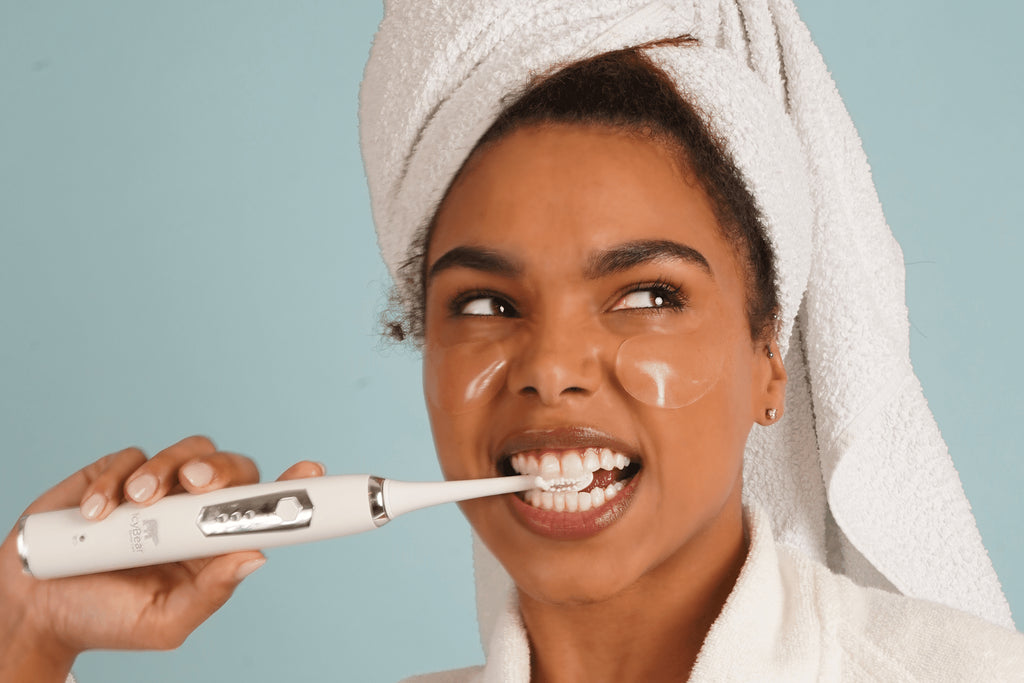Should you brush your teeth after Whitening Strips?

Using teeth whitening strips is a game-changer for anyone aiming for a brighter smile in less time. But one common question is: should you brush your teeth after using whitening strips? Understanding the right post-whitening care can help protect your tooth enamel and ensure your dazzling smile remains healthy and radiant.
Understanding Whitening Strips
What Are Whitening Strips?
Whitening strips are thin, flexible strips coated with an active whitening agent that helps remove surface stains for a whiter smile. Unlike traditional peroxide-based products, Icy Bear Whitening Strips use Phthalimidoperoxycaproic Acid (PAP), an innovative ingredient that effectively brightens teeth without causing sensitivity or damaging tooth enamel.
How Do Whitening Strips Work?
The active whitening ingredient in the strips penetrates the tooth enamel, breaking down stains into smaller molecules, and revealing a brighter smile. Icy Bear's peroxide-free formula makes it an ideal choice for individuals with sensitive teeth, offering a safe and effective solution for gradual whitening. Pairing whitening strips with good oral hygiene practices ensures long-lasting results.
Post-Whitening Care: To Brush or Not to Brush?
Is Brushing Immediately After Safe?
Brushing your teeth immediately after using whitening strips is not recommended. During the whitening process, tooth enamel may become temporarily more porous and sensitive, increasing the risk of irritation. Allowing time for the enamel to recover helps maintain the whitening process while safeguarding your dental health.
What Happens If You Brush Too Soon?
Brushing too soon after using whitening strips can interfere with their effectiveness and exacerbate sensitivity. To achieve a brighter smile while protecting your enamel, it’s essential to wait at least 30-60 minutes before brushing. Following this practice ensures that active whitening ingredients can fully do their job.
When Can You Brush Your Teeth?
Experts recommend brushing your teeth 30 to 60 minutes after removing whitening strips. This ensures your enamel has enough time to re-harden and reduces the risk of gum irritation. Use a soft-bristle toothbrush and non-abrasive toothpaste for sensitive teeth to maintain optimal oral health.
Why Timing Matters
The Role of Saliva
Saliva plays a crucial role in balancing your mouth’s pH levels and aiding in natural oral care. After using whitening strips, saliva helps neutralise any residual whitening solution on your teeth, minimising potential irritation.
Protecting Your Enamel
Tooth enamel is your smile’s first line of defence, and protecting it is vital for dental health. Allowing enamel to recover after whitening treatments ensures a radiant smile without risking damage.
The Right Way to Brush After Whitening Strips
Choose a Soft-Bristled Toothbrush
A soft-bristled toothbrush is gentle on your enamel and gums, helping to remove food particles and maintain oral hygiene without causing abrasion.
Use a Non-Abrasive Toothpaste
Opt for a fluoride toothpaste designed for sensitive teeth. Avoid using whitening toothpaste immediately after treatment, as its abrasive compounds could damage already sensitive enamel.
Gentle Brushing Technique
Brushing with light, circular motions ensures you clean your teeth effectively without harming your gums or enamel. A soft touch is key to protecting your smile.
Complementary Care Tips
Avoid Staining Foods and Drinks
Your teeth are more susceptible to stains after using whitening strips. Avoid acidic foods, coffee, tea, red wine, and dark sauces for at least 24-48 hours to preserve your bright smile.
Rinse with Water
Rinse your mouth with water after eating or drinking anything that could stain your teeth. This simple habit helps prevent discolouration and supports a healthy smile.
Stay Hydrated
Staying hydrated helps flush out food particles and bacteria, keeping your mouth fresh and your oral hygiene routine on track. It’s a key step in maintaining your whitening results.
Maintain Regular Brushing
Consistent brushing and flossing are essential for long-term oral care. Use gentle toothpaste and a soft toothbrush to clean your teeth without risking enamel damage.
FAQs
1. Can I brush my teeth before using whitening strips?
Yes, you can brush your teeth before using whitening strips, but it’s important to be gentle. Brushing 15-30 minutes before applying the strips ensures a clean surface for effective whitening while preventing gum irritation. Avoid over-brushing or using abrasive toothpaste, as it could weaken the enamel.
2. How often should I use whitening strips to see results?
Icy Bear Whitening Strips are designed for daily use for 14 days to achieve a whiter smile. Their peroxide-free formula makes them safe for regular use without causing sensitivity. Consistency is key to achieving and maintaining your bright smile, so follow the recommended schedule for the best results. Always adhere to product instructions for safe and effective whitening.
3. What toothpaste should I use after whitening strips?
After whitening, use a fluoride toothpaste designed for sensitive teeth, like Icy Bear Whitening Toothpaste. This low-abrasion formula strengthens enamel and reduces sensitivity, making it perfect for post-whitening care. Avoid whitening toothpaste immediately after treatment, as its abrasiveness may damage your enamel. Pairing the strips with gentle toothpaste helps maintain your bright smile.
4. Are there alternatives to whitening strips?
Professional whitening treatments are an option, but they can be costly and time-consuming. Icy Bear Whitening Strips offer a convenient, peroxide-free solution for safe at-home whitening. With the added benefit of reduced sensitivity, they’re a popular choice for those seeking a bright smile without the hassle of visiting a dental clinic. Combine with Icy Bear Whitening Toothpaste for enhanced results.
5. Can whitening strips damage my enamel permanently?
Icy Bear Whitening Strips are specially formulated to protect your enamel while delivering effective whitening. Unlike traditional peroxide-based products, the PAP formula ensures a safe and gentle experience. When used correctly, they are enamel-safe, but overuse of any whitening product may cause sensitivity. Protect your smile by following the instructions and using remineralising toothpaste to strengthen enamel.




